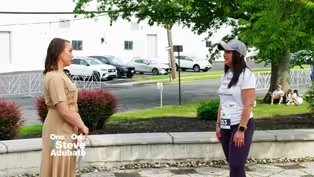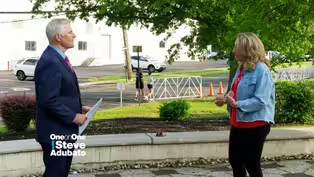One-on-One
President & CEO, Porzio Government Affairs, talks leadership
Clip: Season 2025 Episode 2848 | 10m 14sVideo has Closed Captions
President and CEO of Porzio Government Affairs talks leadership, persuasion, and mentorship
Steve Adubato and One-on-One Contributor Mary Gamba talk with Vito A. Gagliardi, Jr., Managing Principal of Porzio, Bromberg & Newman, P.C. and President and CEO of Porzio Government Affairs, about leadership, persuasion, and the importance of being a mentor to those around you.
Problems playing video? | Closed Captioning Feedback
Problems playing video? | Closed Captioning Feedback
One-on-One is a local public television program presented by NJ PBS
One-on-One
President & CEO, Porzio Government Affairs, talks leadership
Clip: Season 2025 Episode 2848 | 10m 14sVideo has Closed Captions
Steve Adubato and One-on-One Contributor Mary Gamba talk with Vito A. Gagliardi, Jr., Managing Principal of Porzio, Bromberg & Newman, P.C. and President and CEO of Porzio Government Affairs, about leadership, persuasion, and the importance of being a mentor to those around you.
Problems playing video? | Closed Captioning Feedback
How to Watch One-on-One
One-on-One is available to stream on pbs.org and the free PBS App, available on iPhone, Apple TV, Android TV, Android smartphones, Amazon Fire TV, Amazon Fire Tablet, Roku, Samsung Smart TV, and Vizio.
Providing Support for PBS.org
Learn Moreabout PBS online sponsorship(upbeat music) - Recently my colleague Mary Gamba and I on our sister series Lessons in Leadership, sat down and talked to a leader in the field of law.
Vito A Gagliardi Jr. with Porzio.
He's the President and CEO of Porzio Government Affairs.
We talked about how the field of law has changed, leading in law, younger people coming into the law, and frankly, the influence and impact of artificial intelligence in the law.
Vito Gagliardi Jr.
Check it out.
Vito, my friend, good to see you.
- Good to see you.
Thanks for the privilege of being with you.
- You got it.
Hey Vito, do this for us.
You went into the law a few years back because you have a passion for what?
- It was really history.
I, as a young man, very young, quite frankly, grade school, read a lot about history, American history, and it seemed to me, Lincoln, Jefferson, Madison, all of these people doing significant things were lawyers.
And so I decided, not so much that's what I wanted to do, but by the time I was seven, I was certain that's what I was going to do, and I'm blessed to be doing it.
- Now, fast forward a few years in the business and your area of expertise, let everybody know is?
- Sure, education law and employment law on the defense side, management side.
- All these years later, your passion for the law right now is what given these incredibly difficult challenges and uncertain times for law firms across this country.
- Well, as has been the case throughout our history, ironically enough, lawyers play an important role in various acts, aspects of our lives.
It even fascinated me when you watch the news, how many stories are about lawsuits and lawyers and the impact of the judicial branch of our government.
And right now, for better or for worse, we have to acknowledge that lawyers and the judicial branch of government are playing a very significant role in the context of our constitutional democracy.
- It is not a boring time to be in law.
Mary, pick it up.
- Vito, what have you found to be the major difference between when you went into law and the young leaders, the young adults that are choosing to go into law today?
Have the attributes changed?
Have the skills changed in terms of what you need to be successful in the legal profession?
- Well, I think generationally the interest in sacrificing so much of your life in order to be successful at this profession has diminished.
That is to say, and not just for lawyers, but doctors and other professionals, the amount of time you have to devote not just to the study, the academic aspect of it, but the act of being a professional, and devoting time, weekends, nights, whatever, there's less interest in that sort of sacrifice.
And I don't say it in a derisive way that it's necessarily bad, but it is a fact that it's unrealistic to expect that the individuals who graduate from law school today are willing to throw themselves at the profession and make themselves whole by working and putting other things to the side the way mine was.
There are exceptions to every rule, but that's the way I respond to your question in a general way.
- I had a quick follow up to that.
How much of a role did artificial intelligence, AI, how much does that play in these young adults, their ability not to cheat the system?
We don't wanna cheat in law or in process of getting there, but how much of it has made it not easier, but now they have a tool that if I need to find some legal precedent for something, I'm not going to the legal library.
I'm to go through a bunch of books.
I can go to chatGPT, type it in and at least have a start.
No?
- A few years ago, a medical professional in the area of mental health, particularly for children, wrote a book.
And the name of the book was "How to Raise Well Adjusted Children in the Age of Instant Everything" and the Age of Instant Everything naturally touches on our profession.
The individuals who are lawyers now didn't go to school with AI.
So the answer to your question really can't be found for about two or three more years.
But what you have to balance, I think we're talking about work-life balance, and let's just talk about work, work balance.
Naturally, you need to take advantage of the technology to make you efficient.
Clients will insist on it, and the competitive aspect of litigation will insist on it.
But you wanna make sure you're not trading that for laziness.
There still has to be room for creativity and intellect.
And one thing that I don't think artificial intelligence is gonna change is this.
A lawyer that I respect, a great deal, he's passed away.
His name was Mike Cole.
He was chief counsel to Governor Kane.
I worked for him for a while and his wife Jane Le Becky was on the Supreme Court.
He taught me that the most important thing that lawyers bring to the table is their judgment.
Clients will dump a complicated set of facts in their laps and ask the lawyer this question, "What do you think I should do?"
- Yep.
- And if you can't answer that question on a regular basis, you are not very valuable to your clients.
And so artificial intelligence is a tool, but it's not gonna replace that critical skill that lawyers have to bring to the table when asked to solve problems.
- Vito, I have no problem saying, you and I are old school guys all about relationships.
Your dad, an extraordinary public servant in the state of New Jersey.
Look up Vito Gagliardi senior.
You'll see who I'm talking about.
Your dad was a relationship guy, so was my dad.
You and I are those kind of professionals.
This phone, the ability to text.
I said to our son the other day, did you talk to so and so about that job opportunity?
He said, yeah, I talked to him.
I said, you talked to him?
He goes, yeah, we were texting.
And I said, texting's not talking.
He said, come on, question Vito.
We're not here to talk about the younger generation.
This is the way they are.
But the reality is, you and I both know that deals get done, relationships get built, things move forward in large part because of human interaction and relationships.
How much harder is it for younger people in general to engage in human communication, not simply texting?
Yeah.
What deals do you work out with a text or an email?
- So experienced lawyers will tell you, as we were talking a moment ago about balancing efficiency with professionalism.
We'll tell you that, yes, and for quick court appearances from certain depositions, doing it online is so much more sophisticated.
Get in the car, drive to the courthouse, whatever.
But when you went to court for those court appearances or when you were regularly taking depositions in person, the conversations while you were waiting in the hallway, sitting in the courtroom, those sort of conversations often lead to two things.
More expedited resolution of differences.
And as you are just pointing out the building of relationships- - And trust and trust.
- Well, yeah, trust, I think, of course, is part of a good relationship.
And so in my 35 years or so of practicing law, I'll tell you what hasn't changed.
Even with the prevalence of basically all the knowledge the world has literally in your pocket.
The one thing that hasn't changed is this, the most consistent way to get new clients is word of mouth, what people say about you.
Now, they may be able to look things up, but of course, clients love it when someone that they trust says, here's who I use to solve this problem.
You should reach out for this person.
And so I try to encourage younger lawyers, just as you're pointing out, to recognize that dynamic has not changed.
The building of relationships leads to successful outcomes, leads to enhancing your reputation, leads to more success in the marketplace.
- Mary, you and I have obsessed over at our not-for-profit production company, the Caucus Educational Corporation, in our leadership development.
It is relationships and everything that it takes to build relationships.
And I don't see how you separate great leadership from building strong relationships.
Hey, Vito, I wanna thank you and the team at Porzio for joining us.
And we wish you and your team all the best.
Thank you, Vito.
- It's been a pleasure.
Thank you.
- You got it.
See you next time.
- [Narrator] One-On-One with Steve Adubato is a production of the Caucus Educational Corporation.
Funding has been provided by RWJBarnabas Health.
Let’s be healthy together.
The New Jersey Education Association.
Kean University.
PSEG Foundation.
Robert Wood Johnson Foundation.
The Russell Berrie Foundation.
The North Ward Center.
Horizon Blue Cross Blue Shield of New Jersey.
And by New Brunswick Development Corporation.
Promotional support provided by NJBIA.
And by NJBIZ.
- (Narrator) Public service.
It's what we do, at the PSEG Foundation Through volunteer hours, partnerships and our other contributions.
We're committed to empowering communities.
We work hand in hand with you, our neighbors, to educate young people, support research, environmental sustainability and equitable opportunities, provide training and other services all over New Jersey and Long Island.
Uplifting communities.
That's what drives us.
The PSEG Foundation.
Liver transplant recipient discusses the miracle of donation
Video has Closed Captions
Clip: S2025 Ep2848 | 9m | Liver transplant recipient discusses the miracle of donation (9m)
Mother to heart transplant recipient talks about his journey
Video has Closed Captions
Clip: S2025 Ep2848 | 9m 25s | Mother to heart transplant recipient talks about his journey (9m 25s)
Providing Support for PBS.org
Learn Moreabout PBS online sponsorship
- News and Public Affairs

Top journalists deliver compelling original analysis of the hour's headlines.

- News and Public Affairs

FRONTLINE is investigative journalism that questions, explains and changes our world.












Support for PBS provided by:
One-on-One is a local public television program presented by NJ PBS

